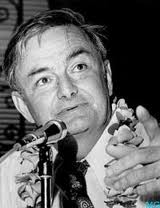Thomas P. Gill Papers

About Tom Gill (1922-2009)
Born in Honolulu on April 21, 1922, Thomas Ponce Gill served just one term in the U.S. House of Representatives, but his long career as an elected official, civil servant, and private attorney advocating social, political, economic, and environmental reform places him in the forefront of those most responsible for creating the Hawaiʻi we know today.
Gill’s father, an architect, moved to Hawaiʻi in 1896, but unlike most members of his ethnicity and class, he sent his son to the Territorial public schools—Lincoln Elementary, Roosevelt High, and the University of Hawaiʻi—encouraging an independent social consciousness that has been one of the hallmarks of Gill’s political life. The Territorial newspapers first mention him in 1945, when Tech. Sergeant Gill, newly returned from the 24th Infantry campaigns in New Guinea and the Philippines (where he earned a Bronze Star and a Purple Heart), is quoted as remarking, “The doughboys don’t get the same publicity as the fliers and some of the others. All they generally get is a row of white crosses.” This early interview is indicative of some of the qualities that sustained Gill throughout his career: a concern for equity and the underdog expressed in a concise, telling phrase. In the 1960s, when he was widely regarded as the most articulate and literate Hawaiʻi politician, Gill’s appearance, youth, war record—and seemingly effortless ability to produce an apt phrase—drew comparisons with John Fitzgerald Kennedy. But in 1946, when the returning veteran first expressed an interest in politics, it was by approaching Republican Party chairman Roy Vitousek. Told “the Republican Party didn’t need anybody,” Gill went to California to attend the University of California School of Law.
Returning to Hawaiʻi in 1951, the young attorney already possessed a strong sense of independence and self-assurance, strikingly revealed in an anecdote told by longtime Democratic Party organizer Dan Aoki, who approached Gill in 1952 about joining the group John Burns was assembling in his campaign to revitalize the Democratic Party. “Join you guys … ,” Gill replied, “how about you guys joining me?” Although clearly not a member of Burns’ inner circle, Gill served as the Oʻahu County Democratic campaign chair for the elections of 1952 and 1954, when the “Democratic Revolution” ended decades of Republican political control in the Territory. Gill was also chair of the Oʻahu County Democratic Committee from 1954 to 1958. In the mid-1950s, while serving as Territorial Senate council and administrative aide to the Speaker of the House, he played a key role in drafting social, economic and environmental legislation considered so liberal that Republican governor Sam King vetoed 71 out of some 80 or 90 pieces of legislation, leading to King’s defeat in the next election.
Gill was first elected to office as Fifteenth District representative to the Thirtieth Territorial Legislature, and in 1959 was elected to the first State of Hawaiʻi Legislature, where he served as majority floor leader. Then in 1962 Gill was elected to the US House of Representatives, Hawaiʻi‘s last at-large representative before the state was divided into two congressional districts. Choosing not to run for re-election in 1964, Gill instead unsuccessfully challenged Hiram Fong for a Senate seat. Gov. John Burns then appointed Gill Director of the Hawaiʻi Office of Economic Opportunity, where he was able to influence social and economic policy.
Although not the candidate preferred by Burns, and despite opposition from both business, who distrusted Gill’s liberalism, and from labor—and in particular the ILWU—who distrusted Gill’s independence, he was elected Lieutenant Governor in 1966. Following losing campaigns for governor in 1970 and 1974, Gill resumed the practice of law.
Widely recognized throughout his career for his intellectual energy and acumen, expressed with a directness and cogency often perceived as impatience and arrogance, Gill’s independence caused his political career to founder often in controversy. But his legacy as a progressive and tireless worker for a more just, open, and sustainable society continues to inspire subsequent generations, including Gary Gill, politician, activist, and youngest of the six Gill children, who once described his father as “a reform-minded person who always attempted to represent the interests of labor and the working people, and to struggle for social and economic justice.”
Compiled by Stan Schab, Center for Biographical Research, University of Hawaiʻi, Jan. 13, 2003.
Additional biographical information about Gill is available in the Honolulu Advertiser‘s obituary.
About the Thomas P. Gill Papers
Thomas P. Gill donated 86 record center boxes of material to the University of Hawaiʻi at Mānoa Library in May 2001. The bulk of the papers cover Gill’s two years in Congress and four years in the Hawaiʻi Lieutenant Governor’s office. The collection is rich in material documenting his enthusiastic political life and his concerns about nuclear power; the environment; land development (especially on the Big Island); social and economic justice; and the high cost of living in Hawaiʻi. There is a smaller amount of material from his pre- and post-Congressional life.
The papers are arranged in five series:
- Political Offices (held by Gill), 1955-1970
- Politics (Democratic Party, Hawaiʻi, and National), 1952-1972
- Personal (election campaigns and biographical material), 1939-2001
- Memorabilia (mostly election campaigns), 1940-2005; bulk 1958-1980
- Audiovisual (audiotapes, films, photographs; primarily election campaigns and Big Island development), 1958-1974
The papers were arranged and described from July 2005 through March 2006 and are available to researchers. Please consult the Finding Aid for a timeline, series descriptions, and specific topics covered in the collection.
Digitized Materials
Portions of the Thomas P. Papers are being digitized and made available online via the collectionʻs finding aid. Materials that have been digitized so far include
- Territorial legislature: Elected representative, House (1958-1959)
- State legislature (1959-1962)

